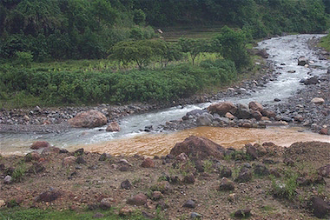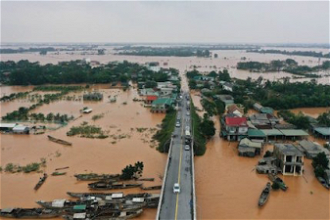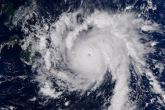Philippines: Church & civil society climate change message for Pope Francis

Fr Edwin A Gariguez
On the occasion of the coming of Pope Francis to the Philippines and his solidarity visit to the typhoon-devastated community, we, in the Church and civil society organizations bring before the Holy Father one important concern that urgently needs Church moral intervention. We refer to the issue of climate change, causing climate-induced disasters and extreme weather events, resulting to catastrophic misery to our people as in the case of super typhoon Haiyan.
The Philippines tops the list of countries most affected countries by weather-related disasters like storms, floods, and heatwaves. Yearly, extreme weather events claim the lives of people and displace families. Facing hunger, increased mortality due to temperature increase, more destructions from extreme weather events, the Philippines is at the doorstep of all the major threat of climate change.
The impacts of climate change to the poor are also experienced by other countries in Asia. The Catholic Church is alarmed of climate change as an “unprecedented threat to humanity.” The Federation of Asian Bishops Conference (FABC) clearly decries how climate is hurting the developing countries in Asia:
“But tragically, ours is a continent of massive poverty, where few enjoy great progress and prosperity while the many suffer in abject deprivation. And it is the poor and the needy who suffer most from the consequences of climate change. We are experiencing dramatic changes of season, extreme changes of weather, more frequently recurring and stronger typhoons, destructive flooding, drying up of whole areas, decrease in food production and spread of climate change related diseases.”
As early as 1988, the Catholic Bishops’ Conference of the Philippines (CBCP) had already articulated the urgency for our faith to take on the ecological challenge: “At this point in the history of our country it is crucial that people motivated by religious faith develop a deep appreciation for the fragility of our islands’ life system and take steps to defend the earth. It is a matter of life and death.”
Clearly, climate change is a moral issue that we in the Church cannot remain passive bystanders. It is for this reason that the Bishops Conference in Asia categorically admits: “As Church we are challenged by this grave situation, since climate change is an ethical, moral and religious issue.”
As categorically declared by the Holy Father, Pope Francis, in his message to the UN Convention on Climate Change, we believe that: “The effective struggle against global warming will only be possible with a responsible collective answer, that goes beyond particular interests and behavior and is developed free of political and economic pressures. It is only possible with a collective answer that is able to overcome attitudes of mistrust and to promote a culture of solidarity, of encounter and of dialogue able to show the responsibility to protect the planet and the human family.”
Therefore, we appeal to the Holy Father to support us in seeking solidarity and justice for the communities affected by the climate crisis.
We need a global climate deal in Paris that will prevent the world from heading towards a catastrophic warming of 5 degrees. We appeal for the Church to encourage governments and political leaders to work together and commit to a global goal, based on science, of limiting warming to the safest level which is below 2 degrees.
Governments of the North, of rich industrialized countries, should commit to and deliver fully and unequivocally their fair share of the effort to solve climate change and ensure a full repayment of the emissions debt owed to the peoples of the South. On the other hand, governments of the South, of developing countries, should stop following the same path of profit-led, destructive high-carbon growth taken by developed countries that benefit only the elites. They should start taking on their fair share of the global effort, and be unrelenting in claiming climate finance and technology from developed country governments for South countries to undertake mitigation actions over and beyond their own fair share of the global effort.
We appeal the Holy Father to join us in demanding all governments to commit to:
• a greenhouse gas emissions reduction pathway and target without having to resort to potentially devastating geo-engineering, or the deliberate and large-scale intervention in the Earth’s climatic system with the aim of reducing global warming;
• a fair and equitable sharing of the global emissions budget, the appropriation of which would be based on science, historical responsibility and capacity – without loopholes and offsets;
• ensure that the welfare and rights of the people are protected in the face of the impacts of climate crisis;
• putting an end to false solutions, the further expansion of carbon markets, and the corporate denomination of the climate negotiations;
• immediately translate mitigation commitments into concrete policies for transformation of energy systems away from fossil fuel.
We appeal to the Holy Father to support us in seeking an end to investments in fossil fuel and ecologically-destructive projects.
Continued burning of fossil fuel will exacerbate the impacts of the changing climate. Mining and other eco-destructive projects which aggravate the climate crisis must be critically evaluated or shunned altogether.
To have at least a 50 per cent chance of limiting global warming below 2 degrees throughout the twenty-first century, the cumulative carbon emissions between 2011 and 2050 need to be limited to around 1,440 gigatonnes of carbon dioxide (Gt CO2). Unabated burning of fossil fuel reserves will result to missing the 2 degree target.
To prevent catastrophic climate change, most of the fossil fuels must remain in the ground. A recent scientific study posits that gobal reserves corresponding to 33% of oil, 49 % of gas, and 82% coal should be classified as unburnable reserves in order to prevent dangerous climate change of more than 2 degrees.
Investing in fossil fuel companies and in eco-destructive projects is synonymous in supporting the destruction of our future. Divestment provides the means to change this status quo – to shift towards a system that will prioritize the welfare of the people and of nature over the relentless pursuit of profit.
To conclude, we are one with the Church in asserting that climate change is an urgent issue that is clearly related to our Christian responsibility to care for the earth and to care for the poor and vulnerable in our midst. The social teachings of the Church are replete with pastoral exhortations invoking for environmental stewardship, social and inter-generational justice, the use of earth’s resources for common good, authentic development, and service for the poor and the vulnerable. All those principles are at stake of being violated when we do not avert or address the causes of climate change.
It is to this end that we welcome Pope Francis to the Philippines, with the hope that our advocacy for the care of the earth and for genuine development and justice for the poor will be taken up as part of the major agenda for his pastoral visit.
Signed by
the Catholic Bishops’ Conference of the Philippines (CBCP) /National Secretariat for Social Action (NASA)/Caritas Philippines and the Philippine Movement for Climate Justice (PMCJ).
Certified by: Fr Edwin A Gariguez, Gerard Arances, Executive Secretary National
Coordinator CBCP/NASSA/Caritas Philippines Philippine Movement for Climate Justice


















